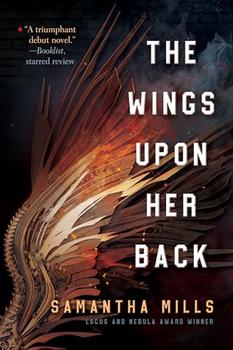Summary | Excerpt | Reviews | Beyond the Book | Readalikes | Genres & Themes | Author Bio

It was you, we are saying. It was your fault. Do things my way, and we can fix this.
But there is another answer, one that sidesteps the question entirely. A truth we would rather not face; a truth we are so loathe to admit that we would rather destroy one another in an eternity of fighting than voice it. What we do not want to admit is this:
There was no defining moment. There was no betrayal. There was no crime so great the gods had little choice but to turn away from us.
It is a simple answer, and deeply unsatisfying. It must have been something we did, we insist, because if it was something we did, then we have the ability to control the outcome in the future. We simply will not do that again!
But the gods lost interest. They retreated. That is all. They left an entire city desperate to pinpoint how it went wrong, and did not bother to offer any consolation. We have spent generations obsessed over who was at fault, how it may be reversed, how we must prove ourselves the next time, but we are arguing over the wrong thing.
The real question is not what did we do to make them leave? But how could they leave us so easily? How could they shower us with gifts, with knowledge, with the burning light of the heavens and the monumental weight of their love, only to take it back again?
Because it is a weight. It is a burden, to be singled out in this way, to be chosen above all others in the world, to be granted a spot at the side of our idols. What would we do to keep the affection of a god? The answer is anything, anything.
And what does it mean for them to witness our devotion—our desperation to please, our prayers and our tears—what does it mean for them to look upon our grief and then shrug and turn away?
I am afraid we can draw only one conclusion, a terrible truth, difficult to bear:
The gods do not love us, and never have.
When I say the gods do not love us, I mean they do not love us in the way we wish. They believe they do; they have said they do; but we operate in a relationship so terribly unbalanced it is more akin to master and pet than parent and child. Now and then we catch their attention. The rest of the time, we are an afterthought.
Here is the truth: they love themselves, and they warm to those who reflect them best. The scholar god values knowledge for the sake of knowledge; the creator god values invention for the sake of invention; and so on, and so on, we know these chants by heart.
They shine their light upon those who share their ideals and turn away from those who don't. The turning away is not malice (take comfort in this), but neither is the light a sign of love. It is wonderful, to bask in that light. It is addictive. A person may do anything to feel it once again. But it is not love.
It is a smile at a mirror's reflection.
And when we accept this truth—this truth, that the gods do not love us in the way we wish—then we must face another truth: it is our choice to follow or not, and always has been. It means the threat that hovers over our every action (do not put a step wrong or they will not love us anymore) is, in the end, an illusion. We are struggling to hold on to something we never possessed to begin with.
I ask again: what is Radezhda? What is our purpose? What is the story of this city, if it is not the story of our gods? Who are we, if we need not strive to be like them?
We could follow their teachings anyway, picking and choosing as they suit us, because we value what we are being taught. At least then it is an honest decision, not made under duress. Or we could pick another life entire.
It is terrible, in its way, terrifying, to be responsible for the course of one's life, with no higher authority to blame. But there is a freedom in it, as well.
The freedom to choose what comes next.
Excerpted from The Wings Upon Her Back by Samantha Mills. Copyright © 2024 by Samantha Mills. Excerpted by permission of Tachyon Publications. All rights reserved. No part of this excerpt may be reproduced or reprinted without permission in writing from the publisher.
Your guide toexceptional books
BookBrowse seeks out and recommends the best in contemporary fiction and nonfiction—books that not only engage and entertain but also deepen our understanding of ourselves and the world around us.